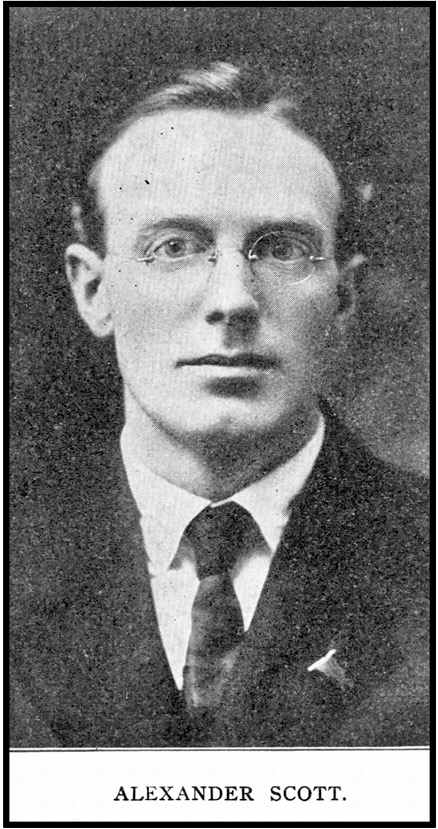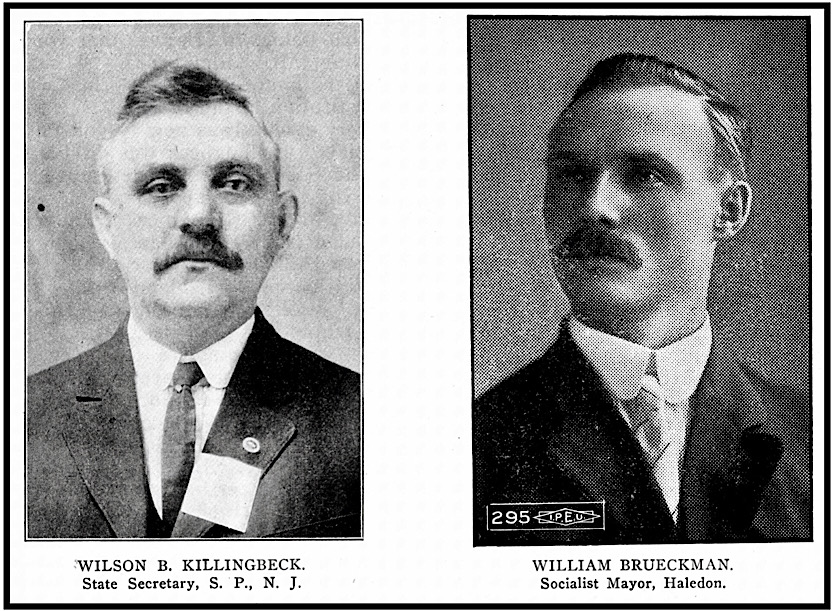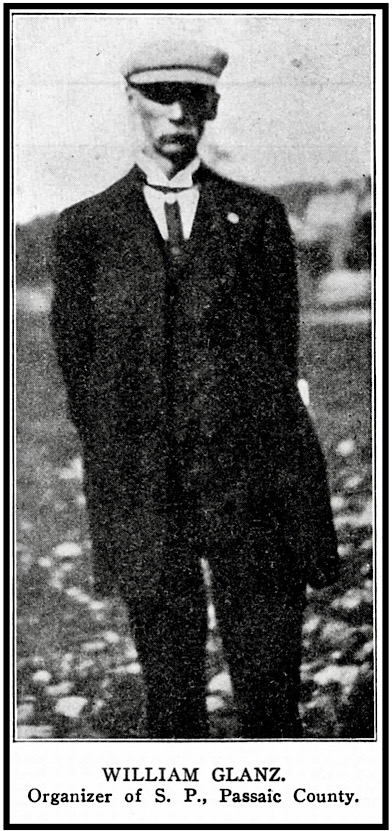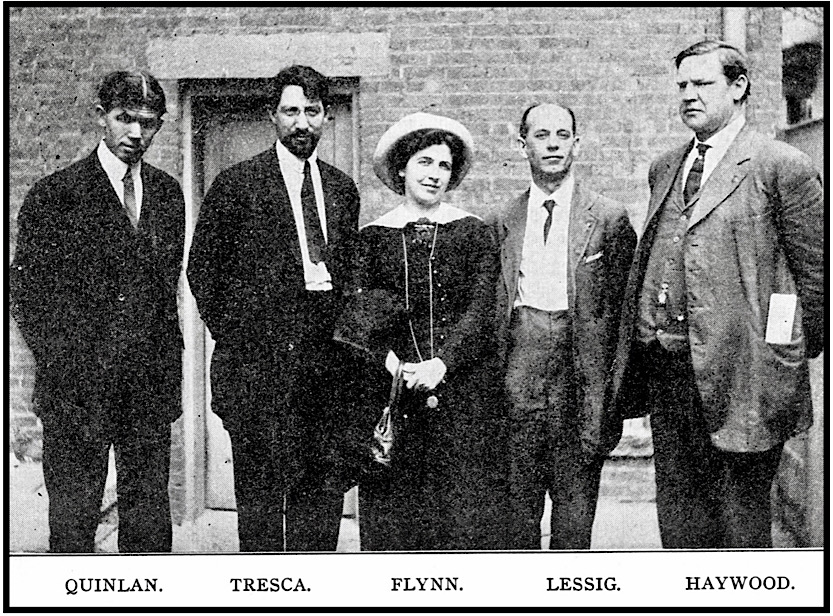 —————
—————
Hellraisers Journal – Saturday June 14, 1913
Paterson, New Jersey – Socialists Party Members Support Strike of Silk Weavers
From the International Socialist Review of June 1913:
What the Reds are Doing
in PatersonBy Alexander Scott
Editor of The Weekly Issue,
Socialist Party Paper of Passaic County.
THE Socialists of Paterson have from the beginning of the silk strike taken an active part and have performed real service for the strikers. How could they help doing so? The fight of the 25,000 silk workers, organized in the I. W. W., was their fight. A majority of the party members are themselves silk workers.
When the general strike was called, the Socialists rolled up their sleeves, ready for any emergency. No question arose as to whether the workers were being organized by the I. W. W., the A. F. of L., or S. L. P. That did not matter then.
Had the strike been called by the A. F. of L.-much as some of us might doubt the sincerity of the organizers of that organization, and dubious as we might be of the outcome of the strike-there is no doubt but that the Paterson Socialists would have as readily jumped into the fray. In fact, when a year or so ago, the Detroit faction of the I. W. W. (S. L. P.) attempted, or pretended to organize the textile workers of the Passaic county, the Socialist Party members assisted, and when it was seen that the workers had been defeated through petty political trickery, they just as readily denounced them as traitors to the working class.
In the present strike, the two arms of the revolutionary labor movement have worked in unison. The Industrial Workers of the World and the Socialist Party have demonstrated the tremendous power of their organizations when united to fight a common enemy. No force is powerful enough to overcome them.
It is the opinion of the writer that the strike would have been lost had we not all fought together, throwing the weight of our organization and press in with the I. W. W.
Let it here be understood that this article is not written with the purpose of showing the superiority of political action over direct action, but with the view of showing the necessity of both political and industrial union action in the struggle of the working class for emancipation.
The general strike was called for February 28. “Nip the strike in the bud,” ordered the mill owners. “Righto. At your service,” replied the city administration, the police, the press and some of the clergy.
The police gave orders that all halls be closed against the I. W. W., and got their clubs in readiness. The newspapers put their lying pens to work, and the clergy prepared sermons to suit the occasion. The strikers had already engaged Turn Hall as their headquarters, and the police had ordered this closed, too, and, moreover, intended to enforce the order by means of their clubs and guns, if necessary.
On the first day of the general strike a few hundred strikers filed out of Turn Hall and proceeded peacefully along the sidewalk in double file, when they were brutally attacked by a gang of blue-coated, brass-buttoned ruffians, headed by their Chief. Clubs were swung right and left, and no discrimination was made as to sex or age. One girl was struck and her cries could be heard two blocks distant.
“Well done!” said the silk bosses, and their editorial lackeys echoed, “Well done!” The bosses’ papers appeared with headlines announcing, “Rioting Strikers Suppressed by Timely Work of Chief of Police Bimson and his Squad of Men-Strike Being Nipped in the Bud.”
Quinlan, Tresca and Miss Flynn and a score of other less known workers in the I. W. W. were locked up. Bail was furnished by Socialists and sympathizers, mostly.
All halls were now closed against the I. W. W., but the union defied the police on the second day, holding a meeting in Turn Hall. This meeting was broken up by the police and the speaker, Wilson B. Killingbeck, State Secretary of the Socialist Party of New Jersey, was arrested. Chief Bimson mounted the platform and read the ancient riot act, ending with this sentence: “God save the KING!” Arrived at the police station, Chief Bimson asked Killingbeck, who had been reading the State Constitution when arrested: “What unknown law was that you were reading, Mr. Killingbeck?” “That,” replied Killingbeck, with a grin, “was the Constitution of the State of New Jersey. It very evidently is new to you Paterson officials.” Killingbeck was discharged.
The Socialists were determined that the right of free speech should not be abridged, and Killingbeck with William Glanz, organizer of the local, engaged the largest hall in the city for a protest demonstration to be held on Friday of the same week. The treasury of the party was empty, but no matter.
On the morning of the evening on which the monster meeting was to be held, police entered Socialist headquarters and seized 5,000 copies of a strike special of the Weekly Issue, organ of the Socialist Party, which had just been issued. The paper had severely criticized the police for their brutality and highhanded action, and contained pictures of the police in action, referring to them as strike-breaking Cossacks. Next a warrant was issued for the arrest of the editor, Alexander Scott, charged with “aiding and abetting hostility to the government,” a crime punishable with fifteen years at hard labor. During the day the detectives were unable to locate Scott, ·but were informed that he would appear at the protest meeting in the evening, and that he would surrender himself there, which he did.
The Socialists had no intention of talking politics at the meeting, so invited the I. W. W. speakers to appear. About 7,000 people packed the Auditorium. The police and city officials were flayed unmercifully by Killingbeck, Miss Flynn, Ewald Koettgen, organizer of the union, and all of the other Socialist and I. W. W. speakers. The editor of the WeeklyIssue was the last speaker and, when he was through, walked to the foot of the hall, where he was placed under arrest. Fully 3,000 strikers followed him to the police station, hooting the police, and it looked as though an attempt would be made to rescue the prisoner. Chief Bimson’s “finest” attacked the crowd like a regiment of Bulgars on the Turkish frontier. Scott was locked up for the night and released in the morning on $2,000 bail.
The general strike was now on in earnest. The brutality and repressive measures employed by the police and courts, and the vile misrepresentation of the capitalist press, accomplished what it would have taken years of agitation to accomplish, namely, the solidification of the ranks of the strikers.
Charges of theft were made against the police for the confiscation of the WeeklyIssue, a Socialist Justice of the Peace, Comrade Paul Heuck, receiving the charge. The four policemen who actually took the papers are now under $200 bail.
The right (limited, though), of free speech was now established, but the corresponding right of free assemblage was being trampled upon. No parades, no loitering, no picketing, no distribution of literature-unless it be capitalist literature. Hundreds of strikers, and many that were not strikers, were arrested for “loitering,” “blocking the traffic,” “inciting to riot,” and what not. Several were arrested for having the Issue in their possession.
It was at this point that State Secretary Killingbeck and William Glanz suggested to the strikers that they go to Haledon, a small borough just outside of Paterson, to hold meetings. The mayor of Haledon, William Brueckman, is a Socialist, and he extended an invitation to the strikers to exercise their constitutional right in his town. The union accepted and every Sunday afternoon since then mammoth outdoor meetings have been held there. At the first meeting held in Haledon, William D. Haywood made a splendid address, and incidentally mentioned the red flag. This was the beginning of the anti-red flag campaign, about which more will be said.
There have been so many arrests that such things no longer arouse interest.
Everything attempted by the mill owners and their servants in office, kept press and cringing clergy to break the strike has only strengthened it. The newspapers lied as regards the extent of the strike, referred to the I. W. W. as a Godless, anarchistic, red flag organization, libeled the leaders, etc., but the workers paid no heed. The patriotism of the workers was appealed to. A “flag day” was arranged for. Large American flags were strung across the street bearing the inscription: “We live under this flag, we work under this flag, we will defend this flag.” The liberty loving citizens were urged to trample upon the red flag of anarchy and the I. W. W. and uphold “old glory.”
The following clipping from the Newark Star about describes how the thing worked:
“With flags flying and the city decked out in gala garb, the great silk mills of Paterson reopened their doors to welcome back 35,000 men and women operatives.
“The ending o.f the gigantic labor war was beautifully planned. The factory owners were going to forgive their erring workmen. Mayor McBride and the police saw the end of their troubles approaching. The ministers who had urged the workers to return understood that their exhortations were to be obeyed.
“It was a very successful end of the strike, marred by only one thing-none of the strikers went back.”
The workers merely winked, got into the spirit of the thing themselves, and on “flag day” thousands were seen on the streets wearing little cards bearing a colored impression of the stars and stripes and this inscription : “WE REFUSE TO SCAB UNDER OUR FLAG.” These cards were gotten up by State Secretary Killingbeck, and paid for by Socialists. Killingbeck is seen in the picture wearing one of the cards.
An American flag and a huge sign bearing a similar inscription to the cards was displayed. from the windows of the Socialist Party headquarters on the main street. Even the WeeklyIssue took a patriotic spell and hired a wagon to go through the streets of the city bearing a sign on which was painted the stars and stripes and this inscription: “The Weekly Issue Refuses to be Muzzled Under this Flag.”
There is no gainsaying the patriotism of the I. W. W.s and the Socialists. As one comrade and striker put it: “We are patriotic as hell.”
The attempt of the A. F. of L., represented by John Golden, Sarah Conboy and the Trades and Labor Council of Paterson, to break the strike only resulted in welding the forces of the strikers and increasing their loyalty to the I. W. W. If any desire on the part of the workers to desert the I. W. W. for the A. F. of L. ever existed, the Armory meeting, at which Sarah Conboy and John Golden were to speak, destroyed it.
Space will not permit an account of this most stirring event. Suffice it to say that Golden, Conboy and their whole gang received the biggest turn-down of their lives. The I. W. W. speakers were forbidden to speak. Questions were not even allowed. Upon hearing this 10,000 workers left the hall in a body, shouting; “Three cheers for the I. W. W.” and leaving the labor fakers standing alone on the platform. About 2,000 returned and decided that since there was going to be no free speech for the I. W. W., neither would there be any free speech for the A. F. of L. The crowd cheered and booed for a solid hour and a half.
Sarah Conboy thought to quiet the mob by holding up the large American flag which covered the speakers’ table. The strikers showed a fine sense of humor by shouting “Three cheers for the stars and stripes-hurrah!” and continued to cheer for an hour.
After a while Chief Bimson and his squad of brass-buttoned plug-uglies lined up and cleared the main floor of the hall, driving everyone to the street. The police were thanked for their fine work by those on the platform. The meeting then continued, the speakers addressing their remarks to the newspaper men and a number of I. W. W. strikers in the gallery, who were posing as respectable, disinterested citizens.
The funeral of Modestino Valentino is something to be remembered. This man, who leaves a pregnant wife and several children, was shot by an O’Brien agency detective while standing on the stoop of his own home. Fully 15,000 followed the hearse to the cemetery, while three bands furnished music. Haywood and Tresca delivered short orations over the open grave, and the army of mourners who stood with heads uncovered, threw red flowers on the coffin.
The union asked for a permit for a May day parade, but were denied, whereupon the Socialist Party secured a permit for a Socialist May day parade, and the strikers had their parade anyway. It was a splendid sight. The Socialist Party headed the procession, which consumed an hour in passing. Hundreds of I. W. W. banners were displayed, and the workers laughed, sang, whistled and cheered.
Many more things should be told about this great labor war, but this is an article-not a book. For instance, there is the trial of Patrick Quinlan and the indictments and future trials of Haywood, Tresca, Miss Flynn, Lessig and the others, but these cannot be covered here. A detective who testified for the defense at the trial of Patrick Quinlan is seen in a picture which accompanies this article.
The Socialists have gathered thousands of dollars for the strikers, and about 250 children have been sent to Socialists and sympathizers in New York and nearby cities to be taken care of.
More money is needed. Send it along at once.
The Paterson strike demonstrates the power and the need of both kinds of working class action. Let us have unity. If you were here you would be taught the necessity of it. Let the revolutionary labor movement use both its arms-and its feet, if necessary.
[Emphasis added.]
~~~~~~~~~~~~~~~~~~~~~~~~~
SOURCES & IMAGES
Quote BBH, IU Socialism w Working Clothes On, NYC Cooper Union Debate w Hillquit, Jan 11, 1912
-Sum of Jan 11 Debate w Hillquit fr NY Call p1, Jan 12
https://www.marxists.org/history/usa/pubs/the-new-york-call/1912/120112-newyorkcall-v05n012.pdf
-Source for Quote is Jan 14 Sunday Call, Stenographic Report, per:
https://books.google.com/books?id=ili0huEKAk0C&pg=PA389&dq=hillquit+haywood+debate&hl=en&newbks=1&newbks_redir=0&sa=X&ved=2ahUKEwjw2s37lI_4AhWVg3IEHdjEAa0Q6AF6BAgEEAI#v=onepage&q=%22hillquit-Haywood%20debate%22&f=false
International Socialist Review
(Chicago, Illinois)
-June 1913, p852
https://www.marxists.org/history/usa/pubs/isr/v13n12-jun-1913-ISR-riaz-ocr.pdf
See also:
The Literary Digest, Volume 46
Funk & Wagnalls, 1913
-June 21, 1913, p1366
(search: “alexander scott”)
https://books.google.com/books?id=iFJFAQAAMAAJ
Industrial Relations
Final Report and Testimony, Volume 3
United States Commission on Industrial Relations
U.S. Government Printing Office, 1916
(search: “alexander scott”)
(Search: “diary of the paterson silk strike”)
https://books.google.com/books?id=luYeAQAAMAAJ
Tag: Alexander Scott
https://weneverforget.org/tag/alexander-scott/
Tag: Paterson Silk Strike of 1913
https://weneverforget.org/tag/paterson-silk-strike-of-1913/
~~~~~~~~~~~~~~~~~~~~~~~~~
There Is Power in a Union · John McCutcheon
Lyrics by Joe Hill




